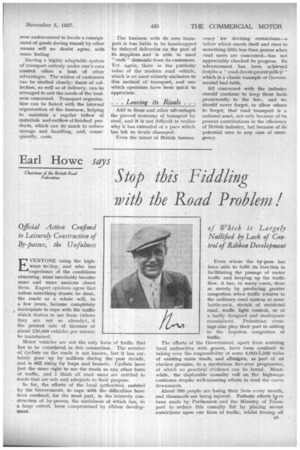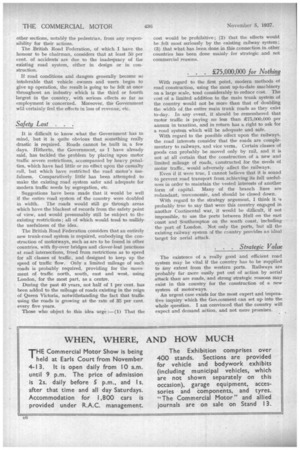Earl Howe says Chairman al . the British Road Fedexation Stop this Fiddling
Page 13

Page 14

If you've noticed an error in this article please click here to report it so we can fix it.
with the Road Problem!
EVERYONE using the highways to-day, and who has experience of the conditions obtaining, must inevitably become more and more anxious about them. Expert opinions agree that unless something drastic be done, the roads as a whole will, in a few years, become completely inadequate to cope with the traffic Which desires to use them (where they are not so already), if the present rate of increase of about 150,000 vehicles per annum be maintained.
Motor vehicles are not the only form of traffic that has to be considered in this connection. The number of cyclists on the roads is not known, but it has certainly gone up by millions during the past decade, and is still rising by leaps and bounds. Cyclists have just the same right to use. the roads as any other form of traffic, and I think all road users are entitled to roads that are safe and adequate to their purpose.
So far, the efforts of the local a,uthoririeS, assisted by the Government, to cope with the diffirulties have been confined, for the most part, to the leisurely construction of by-passes, the usefulness of which has, to a large extent, been compromised by ribbon development. Even where the by-pass has been able to fulfil its function in facilitating the passage of motor traffic and keeping up the traffic flow, it has, in many cases, done so merely by producing greater congestion when traffic returns to the ordinary road system at some bottle-neck, stretch of restricted road, traffic light control, or at a badly designed and inadequate roundabout. Pedestrian crossings also play their part in adding to the hopeless congestion of traffic.
The efforts of the Government, apart from assisting local authorities with grants, have been confined to taking over the responsibility of some 4,000-5,000 miles of existing main roads, and allusions, as part of an election promise, to a mysterious five-year programme, of which no practical evidence can be found. Meanwhile, the deplorable casualty roll on the highways continues despite well-meaning efforts to send the curve downwards.
About 500 people are losing their lives every month, and thousands are being injured. Pathetic effoi Ls have , been made by Parliament and the Ministry of Transport to reduce this casualty list by placing severe restrictions upon one form of traffic, whilst freeing all other sections, notably the pedestrian, from any responsibility for their actions.
The British Road Federation, of which I have the honour to be chairman, considers that at least 50 per cent. of accidents are due to the inadequacy of the existing road system, either in design or in construction.
If road conditions and dangers generally become so intolerable that vehicle owners and users begin to give up operation, the result is going to be felt at once throughout an industry which is the third or fourth largest in the country, with serious effects so far as employment is concerned. Moreover, the Government will certainly feel the effects in loss of revenue, etc.
Safety Last . . .
It is difficult to know_ what the Government has in mind, but it is quite obvious that something really drastic is required. Roads cannot be, built in, a few days. Hitherto, the Government, as I have already said, has tackled the problem by placing upon motor traffic severe restrictions, accompanied by heavy penalties, which have had little or no effect upon the casualty roll, but which have restricted the road motor's usefulness. Comparatively little has been attempted to make the existing road system safer and adequate for modern traffic needs by segregation, etc.
Suggestions have been made that it would be well if the entire road system of the country were doubled in width. The roads would still go through areas which have the blackest of records from the safety point of view, and would presumably still be subject to the existing restrictions; all of which would tend to nullify the usefulness of the idea.
The British Road Federation considers that an entirely new trunk-road system is required, embodying the construction of motorways, such as are to be found in other countries, with fly-over bridges and clover-leaf junctions at road intersections, freed from restrictions as to speed for all classes of traffic, and designed to keep up the speed of traffic flow. Only a limited mileage of such roads is probably required, providing for the movement of traffic north, south, east and west, using London, for the most part, as a centre.
During the past 40 years, not half of 1 per cent, has been added to the mileage of roads existing in the reign of Queen Victoria, notwithstanding the fact that traffic using the roads is growing at the rate of 35 per cent. every five years.
Those who object to this idea urge :—(1) That the • cost would be prohibitive; (2) that the effects would be .felt most seriously by the existing railway system ; (3) that what has been done in this connection in other countries has been done mainly for strategic and not commercial reasons.
. £75,000,000 for Nothirig
With regard to the first point, modern methods of road construction, using the most up-to-date machinery on a large scale, tend considerably to reduce cost. The cost of a limited addition to the main trunk system of the country would not be more than that of doubling the width of the entire main trunk roads as they exist to-day. In any event, it should be remembered that motor traffic is paying no less than £75,000,000 per annum in taxation, and in return has a right to ask for a road system which will be adequate and safe.
With regard to the possible effect upon the railways. the road interests consider that the roads are complementary to railways, and vice versa. Certain classes of goods can probably be moved only by rail, and it is not at all certain that the construction of a new and limited mileage of roads, constructed for the needs of motor traffic, would adversely affect the railways.
Even if it were true, I cannot believe that it is sound to prevent road transport from achieving its full usefulness in order to maintain the vested interests of another form of capital. Many of the branch lines are redundant, uneconomic, and should be closed down.
With regard to the strategy argument, I think it is probably true to say that were this country engaged in another Continental war, it would be difficult, if not impossible, to use the ports between Hull on the east coast and Southampton on the south coast, including the port of London. Not only the ports, but all the existing railway system of the country provides an ideal target for aerial attack.
Strategic Value
The existence of a really good and efficient road system may be vital if the country has to be supplied to any extent from the western ports. Railways are probably far more easily put out of action by aerial attack than are roads, and strong strategic reasons may exist in this country for the construction of a new system of motorways. An urgent case exists for the most expert and imperative inquiry which the Gmernment can set up into the whole question. I am convinced that the country will expect and demand action, and not mere promises.


















































































